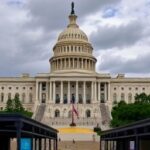Washington, D.C. – With just weeks remaining before enhanced Affordable Care Act subsidies expire at the end of the year, Congress remains deeply divided, leaving millions of Americans on the brink of skyrocketing health insurance premiums and potential coverage losses. Lawmakers from both parties have failed to reach a compromise in marathon negotiations, as fiscal conservatives decry the subsidies’ $400 billion price tag over the next decade while Democrats warn of a health policy catastrophe.
- Enhanced Subsidies Face Uncertain Fate After American Rescue Plan Boost
- Republican Senators Demand Spending Cuts to Offset Subsidy Extension
- Democrats Rally for Full Extension Amid Warnings of Marketplace Meltdown
- Bipartisan Efforts Falter as Lame-Duck Session Looms
- Premium Shockwaves and Coverage Gaps Predicted for 2025
The impasse highlights ongoing battles over the future of the Affordable Care Act, often called Obamacare, which has provided subsidized health insurance to low- and middle-income families through marketplace plans. Without extension, experts estimate premiums could surge by 75% or more in 2025, affecting an estimated 13 million enrollees who currently benefit from the enhanced subsidies introduced during the COVID-19 pandemic.
“This is a ticking time bomb for American families,” said Senate Majority Leader Chuck Schumer (D-NY) during a heated floor speech last week. “Congress must act now to protect health coverage that has saved lives and stabilized markets.”
Enhanced Subsidies Face Uncertain Fate After American Rescue Plan Boost
The subsidies in question stem from the 2021 American Rescue Plan Act, which temporarily supercharged Affordable Care Act financial assistance to combat pandemic-related job losses and uninsured rates. These enhancements capped premiums at 8.5% of household income for many and eliminated them entirely for individuals earning up to 150% of the federal poverty level – far more generous than the original Affordable Care Act structure.
Under the original law, subsidies phased out at 400% of poverty – about $58,320 for an individual in 2024 – but the Rescue Plan removed that cap, drawing in higher-income enrollees. Enrollment in Affordable Care Act marketplace plans hit a record 21.3 million for 2024, with 80% receiving subsidies averaging $705 monthly per the Kaiser Family Foundation.
Without renewal, the Congressional Budget Office (CBO) projects a sharp drop: up to 4 million could lose coverage entirely, and average premiums might jump from $477 to $830 monthly nationwide. Rural states like West Virginia and Kentucky, where Affordable Care Act plans dominate, face the steepest hikes – potentially over 90% in some counties.
- Key Subsidy Stats: 13 million Americans rely on enhanced aid; total cost projected at $335 billion through 2031 if extended.
- Enrollment boom: Up 50% since 2020 due to subsidies and Trump-era rule changes.
- Uninsured risk: Could revert to pre-pandemic levels of 28 million without action.
Republican Senators Demand Spending Cuts to Offset Subsidy Extension
GOP leaders, led by Senate Minority Leader Mitch McConnell (R-KY), have conditioned support on deep spending offsets elsewhere in the federal budget. “We can’t keep borrowing from our grandchildren to fund open-ended entitlements,” McConnell stated in a recent op-ed. Republicans point to the CBO’s estimate that full extension would add $400 billion to deficits over 10 years, exacerbating national debt now topping $35 trillion.
In the House Energy and Commerce Committee, Rep. Brett Guthrie (R-KY), ranking member, proposed pairing subsidies with reforms like work requirements and caps on provider taxes that states use to draw federal matching funds. “Health policy shouldn’t be a blank check,” Guthrie argued during a November hearing. House Republicans passed a slimmed-down extension bill in September, but it stalled in the Democrat-controlled Senate.
Fiscal hawks like Sen. Rand Paul (R-KY) have gone further, advocating outright repeal. “The Affordable Care Act subsidies distort markets and drive up costs for everyone,” Paul tweeted, citing data showing healthy young adults opting out, which inflates risk pools.
Negotiations hit a wall last Thursday when a bipartisan working group dissolved after Democrats rejected GOP demands for Medicaid work requirements, a flashpoint in past health policy fights.
Democrats Rally for Full Extension Amid Warnings of Marketplace Meltdown
Democrats view the subsidies as a cornerstone of successful Affordable Care Act implementation, crediting them with record-low uninsured rates of 7.7% in 2023 per the Census Bureau. House Speaker Emerita Nancy Pelosi (D-CA) warned, “Letting these subsidies lapse would betray working families and undo a decade of progress in health insurance access.”
Senate Finance Committee Chair Ron Wyden (D-OR) has circulated a draft bill for permanent extension without offsets, arguing economic growth will cover costs. “This isn’t spending; it’s an investment in healthier, more productive Americans,” Wyden said. Progressive groups like Families USA echo this, projecting 2.7 million job losses in health care if coverage erodes.
State insurance commissioners, in a letter to Congress signed by 40 officials, urged immediate action: “Premiums will skyrocket, brokers will flee, and insurers may exit markets – repeating the pre-2021 chaos.” Indeed, in 2017, pre-subsidy enhancements saw 40% premium spikes and insurer pullouts from 40% of counties.
- 2024 Open Enrollment: 24 million signed up, fueled by subsidies.
- Post-expiration projection: 10 million fewer enrollees by 2026.
- State impacts: California could see 1 million drop off; Texas 800,000.
Bipartisan Efforts Falter as Lame-Duck Session Looms
With Election Day behind us and a divided Congress returning for a lame-duck session, slim majorities complicate passage. Incoming President-elect Donald Trump has signaled openness to Affordable Care Act tweaks but opposes blank-check subsidies, per transition team statements. “We’ll replace bad policy with better options,” a spokesperson said.
Moderate Republicans like Sens. Susan Collins (R-ME) and Lisa Murkowski (R-AK) co-sponsored a temporary two-year extension, but it lacks votes. In the House, Rep. Don Bacon (R-NE) – facing a competitive district – pushed a compromise tying subsidies to drug price negotiations, gaining 20 GOP co-sponsors before fizzling.
Health policy experts from Brookings Institution warn of ripple effects: higher uncompensated care costs for hospitals ($50 billion annually), strained emergency rooms, and delayed preventive care leading to worse outcomes in chronic diseases like diabetes.
“Congress has bridged divides before – think insulin caps – but time is short,” said Larry Levitt of KFF. Lobbyists from AARP, hospitals, and insurers flood Capitol Hill, with $20 million spent on advocacy this quarter alone.
Premium Shockwaves and Coverage Gaps Predicted for 2025
As expiration nears, insurers are already signaling turmoil. UnitedHealth and Centene, major Affordable Care Act players, have filed preliminary 2025 rates assuming no extension – averages up 10-20% in competitive states, but 50-100% in others. In Ohio, a benchmark plan could rise from $350 to $700 monthly for a family of four.
Vulnerable populations face outsized hits: 40% of subsidy-dependent enrollees are in rural areas, per USDA data, where few alternatives exist. Small businesses, too, could see employee retention issues as health insurance becomes unaffordable.
Looking ahead, the 119th Congress convenes in January with Republicans controlling the House and a narrow Senate edge. Budget reconciliation could fast-track changes, bypassing filibusters, but party-line votes seem likely. Trump administration officials hint at executive actions, like short-term plan expansions, as stopgaps.
Stakeholders urge a year-end deal: “Pass a clean extension now, debate reforms later,” implored America’s Health Insurance Plans CEO Mike Tavenner. Failure risks not just health policy upheaval but midterm backlash, as 60% of voters prioritize affordable health insurance per recent Gallup polls.
Enrollees like Maria Gonzalez, a Texas nurse subsidized at $200 monthly, express anxiety: “Without this, I can’t afford meds or checkups. Congress, please don’t leave us hanging.” As negotiations resume post-Thanksgiving, the clock ticks toward a potential health insurance crisis.








